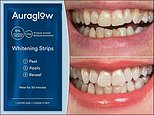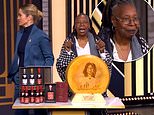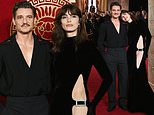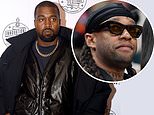The Beatles fans' went wild as Disney+ released their trailer of the band's iconic documentary Let It Be on Tuesday.
Released in May 1970, amidst the swirl of the band's breakup and in tandem with their final LP, with the same name, the film has finally been restored to light.
Helmed by Michael Lindsay-Hogg, the original 1970 film will be on the streaming platform from May 8 after decades of fans struggling to watch it and having to make do with bootleg versions.
Let It Be contains footage not featured in the Get Back docuseries, bringing viewers into the studio and onto Apple Corps’ London rooftop in January 1969 as The Beatles, joined by Billy Preston, write and record their Grammy Award-winning album Let It Be, with its Academy Award-winning title song, and perform live for the final time as a group.
As the trailer was released, fans shared their delight at being able to watch the documentary for the first time in 50 years.

The Beatles fans' went wild as Disney+ released their trailer of the band's iconic documentary Let It Be on Tuesday (pictured John Lennon)

Released in May 1970, amidst the swirl of the band's breakup and in tandem with their final LP, with the same name, the film has finally been restored to light (pictured Sir Paul McCartney)
They wrote: 'This is awesome. Love The Beatles' and 'The big grin I had when I heard the narrator from the original 1970 trailer in HQ'.
'Originally a television documentary, Michael Lindsay-Hogg’s film has been fully and beautifully restored,' wrote another.
With Lindsay-Hogg’s full support, Apple Corps asked Peter Jackson’s Park Road Post Production to dive into a meticulous restoration of the film from the original 16mm negative, which included lovingly remastering the sound using the same MAL de-mix technology that was applied to the Get Back docuseries.
Let It Be, directed by Michael Lindsay-Hogg, stars John Lennon, Paul McCartney, George Harrison, and Ringo Starr, with a special appearance by Billy Preston.
The film also includes new unseen footage which has come to light since Peter Jackson's multiple Emmy Award-winning docuseries The Beatles: Get Back was released, also on Disney+, three years ago.
Lindsay-Hogg says the timing of Let It Be's original release 'very much darkened the perception of the film,' and he says fans will see the 'joy and happiness' when the band took to Apple Corps on Savile Row for rehearsals and the iconic rooftop concert that became their final performance as a group.
'Let It Be was ready to go in October/November 1969, but it didn't come out until April 1970,' he explained.
'One month before its release, The Beatles officially broke up. And so the people went to see Let It Be with sadness in their hearts, thinking, "I'll never see The Beatles together again. I will never have that joy again," and it very much darkened the perception of the film.

Helmed by Michael Lindsay-Hogg, the original 1970 film will be on the streaming platform from May 8 after decades of fans struggling to watch it and having to make do with bootleg versions

Let It Be, directed by Michael Lindsay-Hogg, stars John Lennon , Paul McCartney , George Harrison , and Ringo Starr , with a special appearance by Billy Preston

The film also includes new unseen footage which has come to light since Peter Jackson's multiple Emmy Award-winning docuseries The Beatles: Get Back was released


As the trailer was released, fans shared their delight at being able to watch the documentary for the first time in 50 years

The Beatles ' iconic documentary Let It Be will be available on Disney+ from May 8

Let It Be follows the legendary Liverpool group on their creative journey producing their final album, also Let It Be. This was recently given added context by 2021's The Beatles: Get Back

Pictured: The original poster for the film which was released in 1970
'But in fact, there's a great deal of joy and happiness and creation going on, and Let It Be is - especially when you get to the roof, and you see the exchange and the way that they look at each other - essentially a happy and "up" movie.
'I was knocked out by what Peter was able to do with Get Back, using all the footage I'd shot 50 years previously.'
Apple Corps got Jackson's company, Park Road Post Production, to 'dive into a meticulous restoration of the film from the original 16mm negative,' and used the same technology used for the Get Back series.

Apple Corps got Peter Jackson's company, Park Road Post Production, to 'dive into a meticulous restoration of the film from the original 16mm negative'

The Fab Four's final performance together was on the roof of their London recording base in January 1969

Jackson said: 'Michael Lindsay-Hogg was unfailingly helpful and gracious while I made Get Back, and it's only right that his original movie has the last word'
Jackson added: 'I'm absolutely thrilled that Michael's movie has been restored and is finally being re-released after being unavailable for decades.
'I was so lucky to have access to Michael's outtakes for Get Back, and I've always thought that Let It Be is needed to complete the Get Back story.
'Over three parts, we showed Michael and The Beatles filming a groundbreaking new documentary, and Let It Be is that documentary - the movie they released in 1970.
'I now think of it all as one epic story, finally completed after five decades. The two projects support and enhance each other: Let It Be is the climax of Get Back, while Get Back provides a vital missing context for Let It Be.
'Michael Lindsay-Hogg was unfailingly helpful and gracious while I made Get Back, and it's only right that his original movie has the last word... Looking and sounding far better than it did in 1970.'
Fans of The Fab Four can see Sir Paul McCartney, Sir Ringo Starr, and the late John Lennon and George Harrison alongside the late Billy Preston - the only musician to be given a credit on a Beatles record, after he played the piano on Get Back.
The film was also executively produced by The Beatles, while the producer was Neil Aspinall with Anthony B Richmond as Director of Photography.
Let It Be will debut exclusively on Disney+ on May 8, 2024.






























































































































































